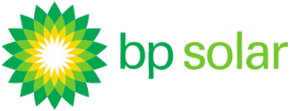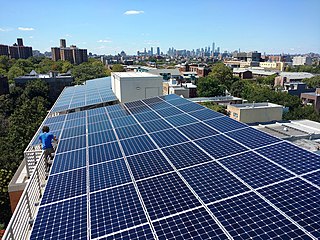
Many countries and territories have installed significant solar power capacity into their electrical grids to supplement or provide an alternative to conventional energy sources. Solar power plants use one of two technologies:

Solar power is a major contributor to electricity supply in Australia. As of December 2023, Australia's over 3.69 million solar PV installations had a combined capacity of 34.2 GW photovoltaic (PV) solar power. In 2019, 59 solar PV projects with a combined capacity of 2,881 MW were either under construction, constructed or due to start construction having reached financial closure. Solar accounted for 12.4% of Australia's total electrical energy production in 2021.

BP Solar was a manufacturer and installer of photovoltaic solar cells headquartered in Madrid, Spain, with production facilities in Frederick, MD, India and the People's Republic of China. It was a subsidiary of BP.

First Solar, Inc. is a public traded American manufacturer of solar panels, and a provider of utility-scale PV power plants and supporting services that include finance, construction, maintenance and end-of-life panel recycling. First Solar uses rigid thin-film modules for its solar panels, and produces CdTe panels using cadmium telluride (CdTe) as a semiconductor. The company was founded in 1990 by inventor Harold McMaster as Solar Cells, Inc. and the Florida Corporation in 1993 with JD Polk. In 1999 it was purchased by True North Partners, LLC, who rebranded it as First Solar, Inc.

India's solar power installed capacity was 84.28 GW AC as of 31 May 2024. India is the third largest producer of solar power globally.

China is the largest market in the world for both photovoltaics and solar thermal energy. China's photovoltaic industry began by making panels for satellites, and transitioned to the manufacture of domestic panels in the late 1990s. After substantial government incentives were introduced in 2011, China's solar power market grew dramatically: the country became the world's leading installer of photovoltaics in 2013. China surpassed Germany as the world's largest producer of photovoltaic energy in 2015, and became the first country to have over 100 GW of total installed photovoltaic capacity in 2017.

Yingli, formally Yingli Green Energy Holding Company Limited -. Yingli Green Energy Holding Company Limited, known as "Yingli Solar," is a solar panel manufacturer. Yingli Green Energy's manufacturing covers the photovoltaic value chain from ingot casting and wafering through solar cell production and solar panel assembly. Yingli's photovoltaic module capacity is 30 GWs.

Solar power includes solar farms as well as local distributed generation, mostly on rooftops and increasingly from community solar arrays. In 2023, utility-scale solar power generated 164.5 terawatt-hours (TWh), or 3.9% of electricity in the United States. Total solar generation that year, including estimated small-scale photovoltaic generation, was 238 TWh.

Historically, the main applications of solar energy technologies in Canada have been non-electric active solar system applications for space heating, water heating and drying crops and lumber. In 2001, there were more than 12,000 residential solar water heating systems and 300 commercial/ industrial solar hot water systems in use. These systems presently comprise a small fraction of Canada's energy use, but some government studies suggest they could make up as much as five percent of the country's energy needs by the year 2025.

BrightSource Energy, Inc. is an Oakland, California based, corporation that designs, builds, finances, and operates utility-scale solar power plants. Greentech Media ranked BrightSource as one of the top 10 greentech startups in the world in 2008.

Between 1992 and 2023, the worldwide usage of photovoltaics (PV) increased exponentially. During this period, it evolved from a niche market of small-scale applications to a mainstream electricity source. From 2016-2022 it has seen an annual capacity and production growth rate of around 26%- doubling approximately every three years.

EDF Renewables is a wholly owned subsidiary of the French utility EDF Group, specializing in renewable energy production. As an integrated operator, the Group develops and finances the construction of renewable energy facilities, and manages operations and maintenance for its own account and for third parties.

Sarnia Photovoltaic Power Plant near Sarnia, Ontario, is Canada's largest photovoltaic plant with an installed capacity of 97 MWP (80 MWAC).

The total installed solar power in Brazil was estimated at 41.1 GW at April 2024, which consists of about 18.0% of the country's electricity matrix. In 2022, Brazil was the 8th country in the world in terms of installed solar power capacity.
Solar power in Chile is an increasingly important source of energy. Total installed photovoltaic (PV) capacity in Chile reached 8.36 GW in 2023. Solar energy provided 19.9% of national electricity generation in Chile in 2023, compared to less than 0.1% in 2013.
Mount Signal Solar, also known as Imperial Valley Solar Project, is a 794 MWp (614 MWAC) photovoltaic power station west of Calexico, California, United States, in the southern Imperial Valley, near the Mexican border. The facility is being developed and constructed by 8minutenergy Renewables in three phases, with two completed as of 2018. At full build-out, it will be one of the world's largest PV solar farms with a capacity of about 800 MWp (600 MWAC). The project has been supported by several environmental groups, as the power station was built on low productivity farmland.

JinkoSolar Holding Co., Ltd. is a solar module manufacturer headquartered in Shanghai, China, and listed on the New York Stock Exchange since 2010. Its subsidiary Jinko Solar Co., Ltd. was listed on the Shanghai Stock Exchange's Science and Technology Innovation Board in 2022.

Vikram Solar Limited is an Indian company based in Kolkata. It is one of the largest solar module manufacturers in India, with 3.5 GW module manufacturing capacity annually and the second-largest solar energy company in India by revenue. The company's primary business focus is manufacturing solar PV modules, and also carrying out engineering, procurement, and construction services and operations, and maintenance of solar power plants.














